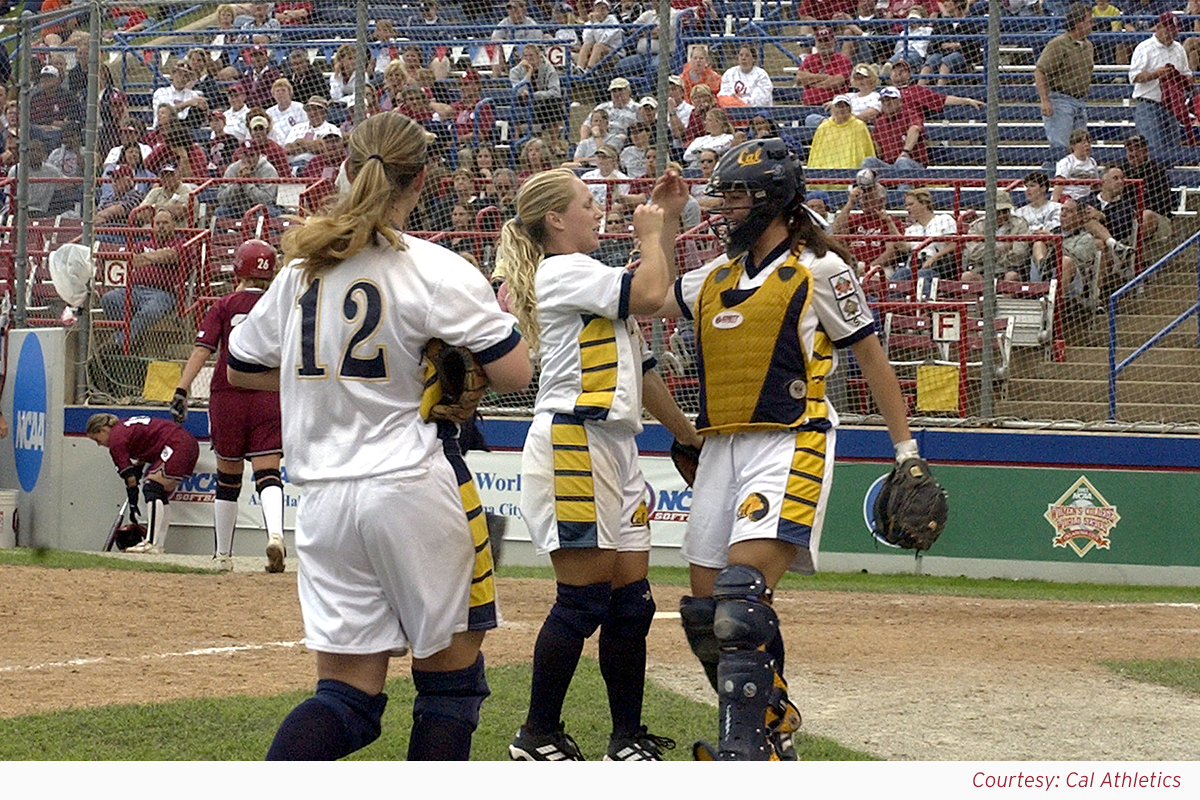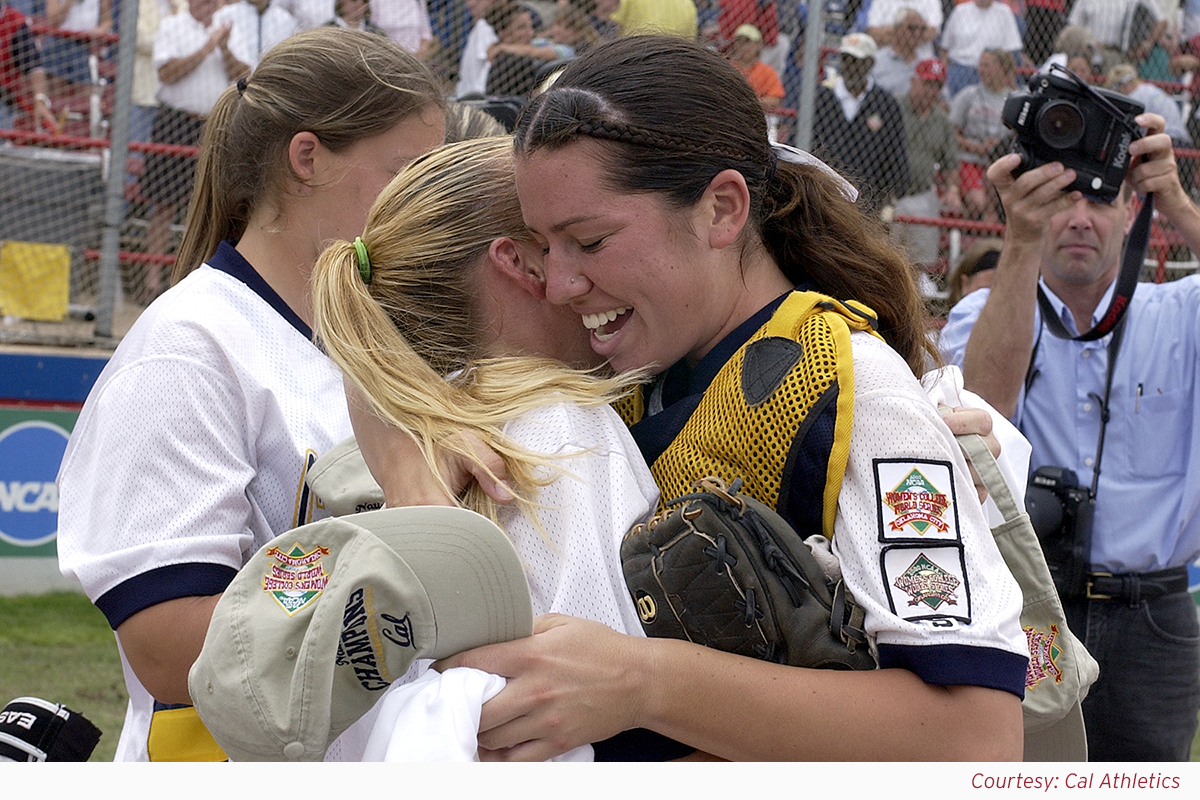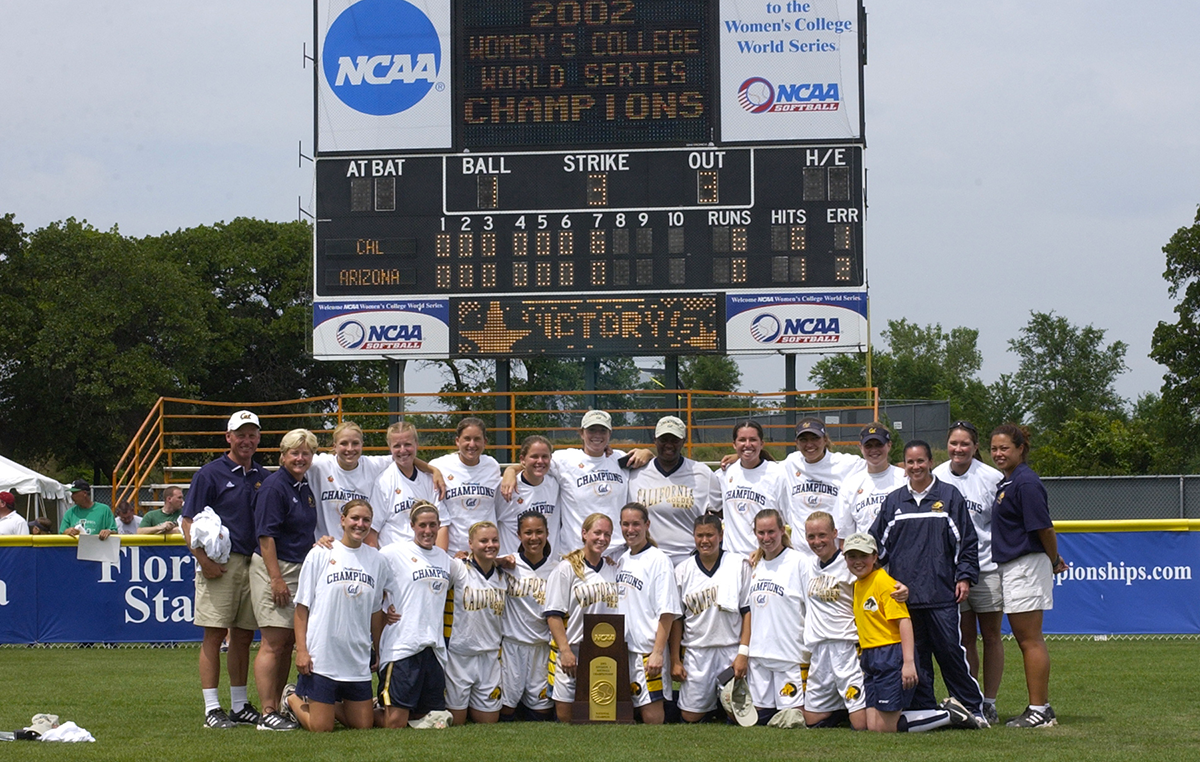

Part 3
ArkansasRazorbacks.com has developed a multi-part series features new softball head coach Courtney Deifel which will be posted in individual parts over the coming weeks. The series continues with her playing days at California that included a 2002 Women’s College World Series national championship. (Click here to read Part 1) (Click here to read Part 2)
When it comes to being a catcher, all the clichés fit. Coach on the field. Captain of the defense. Brains of the operation. Throw whatever term comes to mind and the right catcher will likely frame it to steal a strike call. Or in the case of Razorback head coach Courtney Deifel, she’ll assess the situation and call the appropriate pitch to put her team in the best position to win.
“She really showed the knack for (calling pitches),” University of California softball head coach Diane Ninemire said. “She demonstrated that she could mix the pitches and read the batters’ swings. We had the utmost confidence in her ability to deal with the pitchers and know exactly what to call. That’s a bit of a rarity because the game has changed a bit and a lot of younger catchers just aren’t being taught to call the game. But every once in a while you’ll get a kid that can do it and when you do, it’s pretty special. She was special with that.”
Deifel made the 180-mile trip from her hometown of Fresno, Calif., to the Berkeley campus where she made a new home behind the plate at Cal where she caught seven no-hitters during her career. Individually, the accolades were plentiful. Deifel capped her career in 2003 by being named to the NFCA All-America Second Team, an honor that went along with her two All-Pac 10 selections and NCAA All-Regional plaudits. But the highlight came as a junior during Cal’s run of annual appearances at the Women’s College World Series.

In what Ninemire called a David vs. Goliath matchup, her team faced six-time and defending national champion Arizona and its star pitcher Jennie Finch in the 2002 championship game. The teams had met three times during the year with Cal winning two of the games but it was the Bears’ first-ever appearance in the title game.
“Nobody thought we would do it,” Deifel remembers. “We walked into the stadium and there was Arizona everywhere. I think that’s what fueled us. It was more about winning that game than winning the championship. I think that was our mindset going in. We were the underdog and we thrived in that role. There was always someone bigger and better. It’s fun being the underdog.”
The game remained scoreless until the top of the seventh inning when Cal scored six runs off Finch, including an RBI walk by Deifel with the bases loaded. Staked to a six-run lead, she and battery mate Jocelyn Forest took care of the rest. With Deifel making the calls behind the plate, Forest struck out the side to secure the program’s first national title.
“When we went back out there for the bottom of the seventh, it was like she was in my head,” Forest said. “There were no questions, no need for me to shake anything off. We were in a rhythm. On the last pitch of the game, she called a change-up which was one of our go-to pitches and we got the girl to swing and miss. It was all so surreal. It was happy, exciting and relieving all wrapped into one moment.”
“That team had a bond that will never be diminished here,” Ninemire continued. “It was the only team to ever win a national title and we strive every day to be just like them. They really rallied and pulled together, which was probably more important than ever for Courtney because she had a pitcher that was going through a very difficult time. I give her a lot of credit for being able to work through that with Jocelyn to get her mind in the right place to win a national championship. I think a lot of life lessons were learned during that process.”

While Deifel always showed her defensive prowess, the offensive side at Cal was a slower burn. Over the first two years of her collegiate career, she combined for three home runs and 39 RBI. As a junior, however, Deifel emerged as a reliable bat in the lineup with a team-leading 46 RBI to go with three home runs and a career-best .301 batting average. She went on to lead the team in doubles and RBI as a senior to go along with a career-high seven home runs, finishing her career with 13 home runs and 127 RBI.
Playing more than 70 game per season, Deifel was a constant behind the plate during her four-year stay in Berkeley with 285 starts for the Bears. Defensively, she still owns the program’s all-time record with 1,969 putouts working with Forest and the entire Cal pitching staff. Deifel made a habit of making her pitchers the best version of themselves when she was catching them.
“I always tell my kids you’re only as good as your catcher,” Forest says during her private lessons. “(Catchers) do so much work, and generally, don’t get much of the glory. You need a catcher that can steal you a strike that was maybe 4-5 inches off the plate or a catcher who can call that timeout to give you a few extra seconds to get things back on track. Without a doubt, I wouldn’t have had the success that I had if I didn’t have such a solid catcher behind the plate.”
Quite the statement for someone as accomplished as Forest who pitched to Deifel from 2000-02. In that final season together, Forest tallied a career-high 29 wins and 379 strikeouts. Overall, Forest totaled 103 wins, 106 complete games, 52 shutouts and 1,203 strikeouts in 993.2 innings of work. Those number equaled a pair of All-America honors and three All-Pac 10 selections. Deifel also caught two of Forest’s three career no-hitters.

In four years at Cal, Deifel and her teammates made four trips to Oklahoma City to play in the Women’s College World Series. After seventh- and fifth-place national finishes in 2000 and 2001, respectively, Cal finally broke through in 2002. Deifel helped lead the team to an 11-game winning streak that extended through the championship game. Cal went 8-0 in NCAA postseason play that year.
“We were never the most talented team,” Deifel said. “If you looked player for player, we never matched up with teams like Arizona or UCLA at that time. Every year, we would play our best softball at the end, which is really what it’s all about. The World Series is just something that we did. That grew to be the norm for us.”
Deifel closed her career with a return trip to the NCAA championship game at the 2003 Women’s College World Series and came away with a runner-up finish. Deifel and her teammates had set the standard for future Cal teams which carried over into a third-consecutive appearance in the championship game during the 2004 season.